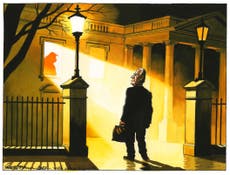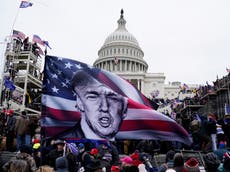Barack, Bill and Dubya: How Democrats came to embrace George W Bush
Keeping quiet on politics, combined with nostalgia viewed through Trump-coloured glasses, has reformed Mr Bush's image, writes Justin Vallejo

Your support helps us to tell the story
From reproductive rights to climate change to Big Tech, The Independent is on the ground when the story is developing. Whether it's investigating the financials of Elon Musk's pro-Trump PAC or producing our latest documentary, 'The A Word', which shines a light on the American women fighting for reproductive rights, we know how important it is to parse out the facts from the messaging.
At such a critical moment in US history, we need reporters on the ground. Your donation allows us to keep sending journalists to speak to both sides of the story.
The Independent is trusted by Americans across the entire political spectrum. And unlike many other quality news outlets, we choose not to lock Americans out of our reporting and analysis with paywalls. We believe quality journalism should be available to everyone, paid for by those who can afford it.
Your support makes all the difference.It's not a bug, it's a feature.
The silence of George W Bush on the presidency of Donald Trump was widely lamented by his supporters during the 2020 election. But his adherence to the tradition of former presidents remaining neutral may be the only credible attempt at the healing espoused by president-elect Joe Biden.
With Mr Trump becoming the first in 152 years to skip a successor's inauguration, Mr Bush standing alongside Barack Obama, Bill Clinton and Joe Biden is an image of continuity at a time when few norms remain unbroken.
Read more: Follow live updates and news on Inauguration Day 202
"He's always been a firm believer of following in his father's footsteps that presidents of the United States don't weigh in on future presidential campaigns,” John Farner, who worked for Mr Bush’s 2000 campaign and Commerce Department, told The Independent.
Mr Farner is co-founder of the group 43 Alumni for Biden, about 500 ex-Bush administration staffers who supported the former president’s position of silence while other Never Trump Republicans hoped he would speak out.
“He’s stayed true to those beliefs,” Mr Farner said. “We’re very happy to see him attend the inauguration. He's always believed in the outcome of this election that president-elect [Biden] was the fairly elected president of the United States.”
Maintaining neutrality may seem unusual to the standard American diet of presidents Trump, Obama, and Clinton. But for the British, it has a distinctly familiar flavour. Unlikely as it seemed in the 2000s, being an unspeaking symbol of continuity not swayed by the politics of the day has transformed "43" into the closest parallel the United States has to the Queen.
Keeping quiet on politics, combined with nostalgia viewed through Trump-coloured glasses, has reformed Mr Bush's image among Democrats from "Dubya" the Iraq war criminal to the kindly, 74-year-old grandpa sharing candy and cuddles with the Obamas and Clintons.
Or as comedian Aziz Ansari put it during his Saturday Night Live monologue after Mr Trump's inauguration:
“What the hell has happened? I’m sitting here wistfully watching old George W Bush speeches? Just sitting there like, what a leader he was! Sixteen years ago I was certain this dude was a dildo. Now I'm sitting there like, he guided us with his eloquence!"
While rare among American leaders today, the tradition of presidents not criticizing successors was the standard before Mr Clinton and Mr Obama left office only to sink deeper into the Democratic establishment as the party's kingmakers and most effective campaigners.
When they double-downed on Mr Trump in 2020, the president tweeted "Barack Hussain Obama is the first Ex-President to ever speak against his successor, which was long tradition of decorum and decency. Should anyone really be surprised?"
In the past year, Mr Bush released statements to lament the death of George Floyd and Ruth Bader Ginsberg, congratulate Mr Biden on his win and Mr Trump on his campaign, and denounce the riots at the US Capitol riots. In each case, he made no overt political manoeuvre to put points on the board for his own team.
“President Bush has made clear that he is retired from presidential politics and doesn’t plan to wade in,” Mr Bush’s current spokesman, Freddy Ford, told The Atlantic two weeks before the election.
The closest he came to election-season commentary came in a short speech at the Bush Centre in September.
“This is a really weird year—obviously,” Mr Bush said. "As people grapple for a way forward for our country, I think if they look at the principles that guide our programs, they will see an optimistic future.”
Even in a year as weird as the last, Mr Bush rarely went off-script.
From 2000 to 2009, the presidency of "Dubya" was the left-wing's mixtape of the right-wing's most egregious failures.
Dubya was the original "not my president" in the disputed win over Al Gore. He declared the "Axis of Evil" and sold the weapons of mass destruction hoax to invade Iraq, before declaring "Mission Accomplished" in Top Gun cosplay. He failed to capture Osama bin Laden in Afghanistan after September 11. There was the whole Patriot Act, extra-judicial renditions, waterboarding, Guantanamo Bay, and the Abu Ghraib prisoner abuse scandal.
On the B-side was banning abortion aid. Abandoning the Kyoto Protocol climate change treaty. The leak of CIA operative Valerie Plame's identity after her husband questioned the case for the Iraq war. Blackwater defence contracts. He built 700-miles of wall on the Mexico border years before Mr Trump descended a golden escalator to announce his candidacy.
Then there the was Mr Bush's self-described "all-time low" of Hurricane Katrina. The iconic image of Mr Bush flying over New Orleans returning from vacation, and saying the Fema director was "doing a heckuva" job, while horror unfolded below was recalled in his memoir Decision Points as the worst moment of his presidency
Or as Kanye West put it: "George Bush doesn't care about black people".
He was the Democrats’ big bad before their idea of bad got bigger. But on the plus side, Mr Bush was mostly silent throughout the scandals of the Obama administration. From Obamacare to Obamagate, he made little comment.
The NSA spying scandal exposed by Edward Snowden. Operation Fast and Furious to arm Mexican drug cartels. The Iran nuclear ransom. The Veteran Affairs death-list. Spying on journalists. Targeting of conservative groups by the Internal Revenue Service. The escalation of civilian-killing drone bombings. The attack on Benghazi. Hilary Clinton's emails.
Even when Mr Obama wore a tan suit. Dubya said nothing.
Add a few years of Trumpism and suddenly the Republican who stole a Democrat’s presidency began looking markedly more presidential than he ever did while in the Oval Office. As Star Trek’s George Takei put it: “You know things are bad when George W Bush starts sounding like a member of the Resistance.”
Even The View host Joy Behar said she was "after" him for eight years but might now buy one of his paintings.
“The thing about this,” Ms Behar said, “is that Donald has now done something I thought he would never do. I like — I like the fact that George Bush — I like George Bush now, is what I’m trying to say. I’m having trouble saying it.”
Mr Bush left the White House with a 33 per cent approval rating only to see it double to 61 per cent 10-years later in the middle of Mr Trump's term. Favorability among Democrats grew from 11 per cent in January 2009 to 54 per cent in January 2018.
While Mr Trump may have been the best thing to happen to Mr Bush's legacy, the heavy lifting was done by the Obamas.
As Mr Obama wrote in his memoir, he blamed the Bush administration for the Great Recession that defined the era, and they remained ideological opponents on nearly all their political positions. In the years since, however, their cosy relationship - especially with Michelle Obama - signaled Mr Bush's acceptance into their club.
"I disagreed with just about every one of George W Bush's major policy decisions, but I'd come to like the man, finding him to be straightforward, disarming, and self-deprecating in his humour," Mr Obama wrote in A Promised Land.
Among the most iconic moments were Ms Obama and Mr Bush hugging and holding hands throughout 2016, and the cough drop sharing at the funerals of Mr Bush's father and senator John McCain. In 2019, Ms Obama defended Ellen DeGeneres for being kind with the former president at a football game.
Time, Trump and temperament helped. Mr Farner, however, says the simple absence from participation in policy setting or discourse is enough to heal all wounds. Maybe even those self-inflicted by Mr Trump.
"We're all Americans and I think that you can't let politics and difference of opinion stand in the way of friendships. And unfortunately with the political discord being what it is today that's what we're seeing, is that policy differences have got in the way of civil interactions and discussion,” Mr Farner said.
“I think that it speaks volumes for the unification of our country that president Bush continues to work across party lines with president Obama, with president Clinton and now president-elect Biden in working to unify the country,” he added.
Neither of the current White House combatants has shown a willingness to holster their rhetoric and come together after the inauguration, like the example set by Mr Bush. Mr Trump continues with his unproven claims the election was stolen, while Mr Biden has been less enthusiastic to practice the healing he has been so enthusiastic to preach.
“I was told on the way over here that he indicated he wasn’t going to show up at the inauguration: One of the few things he and I have ever agreed on,” Mr Biden said after Mr Trump announced his plans. “It’s a good thing, him not showing up.”
With Mr Trump’s absence leaving the "America United" inauguration demonstrably divided, it is left to Mr Bush to fill the role of an ex-Republican president symbolizing the peaceful transfer of power.




Join our commenting forum
Join thought-provoking conversations, follow other Independent readers and see their replies
Comments